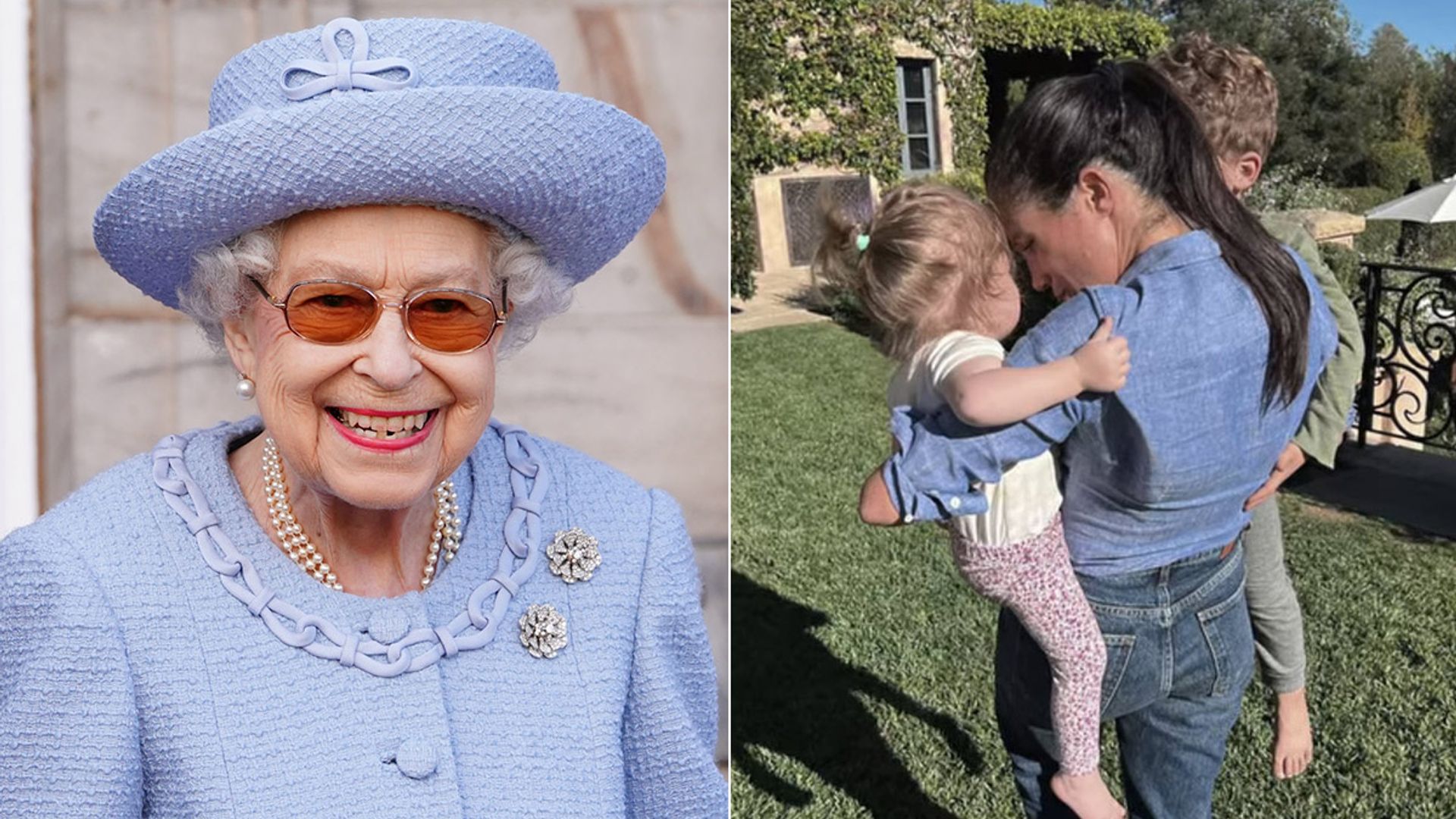Meet Lilibet: The Royal Baby With An International Name
Lilibet: A Name Steeped in Royal History and Affection
Lilibet is a diminutive form of Elizabeth, a name of Hebrew origin meaning "My God is abundance." It gained prominence as the affectionate nickname for Queen Elizabeth II, given to her by her close family members.
Queen Elizabeth II, born Elizabeth Alexandra Mary Windsor, was the longest-reigning monarch in British history. Lilibet became her intimate and cherished family name, a testament to the close bond she shared with her loved ones. The nickname reflects the warmth and informality within the royal family, contrasting with the formality associated with the public persona of the Queen.
- Back To The Future 4k The Ultimate Experience For Scifi Fans
- Vega Moviecom Your Ultimate Destination For Cinematic Adventures
Lilibet
Introduction
Key Aspects:- Familial Affection: Lilibet served as a cherished term of endearment within the royal family, a reflection of the close and loving bond between Queen Elizabeth II and her immediate circle.
- Historical Context: The nickname originated during the Queen's childhood, when she struggled to pronounce her own name, Elizabeth. It became a symbol of her playful and endearing nature, capturing her essence beyond her royal title.
- Public Perception: While primarily used within the royal family, the nickname Lilibet occasionally appeared in the public sphere, offering a glimpse into the Queen's personal side and humanizing her public image.
Lilibet and the Royal Family
Introduction: Exploring the Role of Lilibet within the Family DynamicFacets:- Intimate Bonds: Lilibet fostered a sense of closeness and intimacy within the royal family, creating a private space where formality was shed and genuine connections were formed.
- Familial Traditions: The use of Lilibet as a nickname became a cherished tradition, passed down through generations, reflecting the continuity and enduring bonds within the royal lineage.
- Personal Identity: For Queen Elizabeth II, Lilibet represented a sense of personal identity, separate from her public role as monarch, allowing her to connect with her family on a more intimate level.
Lilibet and the Public
Introduction: Examining the Impact of Lilibet on the Public Perception of the Royal FamilyFurther Analysis:- Humanizing the Monarchy: The occasional public use of Lilibet provided a glimpse into the Queen's personal life, making the monarchy appear more approachable and relatable to the public.
- Media Scrutiny: While the nickname primarily remained within the private sphere, its occasional public appearances drew media attention, highlighting the fascination with the personal lives of the royal family.
- Cultural Impact: Lilibet became a part of popular culture, with references in literature, music, and even merchandise, reflecting its broader cultural significance beyond the royal family.
lilibet
Lilibet, a diminutive form of Elizabeth, holds significance as a cherished nickname for Queen Elizabeth II, embodying familial affection, historical context, and public perception.
- Intimate endearment: Lilibet fostered a sense of closeness within the royal family.
- Historical connection: Originating from the Queen's childhood, it reflects her playful nature.
- Public perception: Its occasional public use offered a glimpse into her personal side.
- Familial tradition: The use of Lilibet as a nickname became a cherished tradition, passed down through generations.
- Cultural impact: Lilibet has become a part of popular culture, appearing in literature, music, and merchandise.
These aspects intertwine to showcase the multifaceted nature of Lilibet, a name steeped in familial bonds, historical significance, and cultural resonance. It serves as a testament to the Queen's personal identity, her relationship with her family, and her enduring presence in the public consciousness.
Intimate endearment
The nickname "Lilibet" played a crucial role in fostering a sense of intimacy and closeness within the British royal family. It originated as a playful term of endearment used by the Queen's close family members, particularly her husband, Prince Philip. Unlike the formal title "Queen Elizabeth II," the nickname "Lilibet" carried a deeply personal and affectionate connotation, reflecting the genuine bonds and shared experiences within the family circle.
- Unveiling The World Of Ibomma Telugu Movies New 2024
- Stream Terrifier 3 For Free Your Ultimate Guide To Unleashing The Horror
The use of "Lilibet" created a private space where the royal family could interact with each other on a more personal level, shedding the formality associated with their public roles. It allowed them to connect as a family, sharing moments of joy, laughter, and support. The nickname served as a reminder of the shared history, love, and mutual respect that bound them together.
The intimate nature of "Lilibet" also allowed the royal family to maintain a sense of normalcy amidst their extraordinary lives. It provided a refuge from the public scrutiny and pressures that came with their positions, allowing them to simply be themselves in each other's company. The nickname thus played a vital role in preserving the close familial bonds that were so essential to the well-being and happiness of the royal family.
Historical connection
The nickname "Lilibet" holds significant historical relevance, tracing its origins back to Queen Elizabeth II's childhood. As a young princess, she struggled to pronounce her own name, Elizabeth, and instead uttered "Lilibet." This endearing mispronunciation was adopted by her family as a term of affection, capturing her playful and innocent nature.
- Origin and Meaning: The nickname "Lilibet" originated as a playful twist on Elizabeth, reflecting the Queen's childhood speech patterns. It became a symbol of her youthful innocence and the close bond she shared with her family.
- Continuity of Tradition: The use of "Lilibet" as a nickname was passed down through generations of the royal family, becoming a cherished tradition that connected the Queen to her ancestors. It served as a reminder of her family's history and the continuity of the monarchy.
- Reflection of Character: The nickname "Lilibet" provided a glimpse into the Queen's personality, revealing her playful and lighthearted nature. It contrasted with the formal and dignified image she projected as monarch, showcasing her ability to balance duty with a sense of fun.
- Historical Significance: The nickname "Lilibet" became an integral part of Queen Elizabeth II's identity, shaping her public persona and leaving a lasting legacy. It symbolized her connection to her family, her playful spirit, and her enduring popularity among the British people.
In conclusion, the historical connection of "Lilibet" to the Queen's childhood not only reflects her playful nature but also highlights the deep familial bonds within the royal family. It serves as a testament to the Queen's enduring legacy and the profound impact she had on British history and culture.
Public perception
The occasional public use of the nickname "Lilibet" offered valuable insights into the personal side of Queen Elizabeth II, allowing the public to connect with her on a more human level. It provided a glimpse into her private life, revealing her warmth, humor, and genuine nature.
- Humanizing the Monarchy: The use of "Lilibet" in public settings helped to humanize the monarchy, making it more approachable and relatable to the British people. It showed that behind the formal facade, the Queen was a loving grandmother, a devoted wife, and a woman with a playful spirit.
- Media Scrutiny: While the nickname was primarily used within the royal family, its occasional public appearances drew media attention, highlighting the public's fascination with the Queen's personal life. It provided a contrast to the official image of the monarch, offering a more intimate and authentic portrayal.
- Cultural Impact: The public use of "Lilibet" had a wider cultural impact, influencing popular culture and media representations of the royal family. It became a symbol of the Queen's enduring popularity and her ability to connect with people from all walks of life.
In conclusion, the occasional public use of "Lilibet" played a significant role in shaping public perception of Queen Elizabeth II. It offered a glimpse into her personal side, humanized the monarchy, and had a lasting impact on British culture. By understanding the connection between "Lilibet" and public perception, we gain a deeper appreciation for the Queen's multifaceted personality and her profound influence on the British people.
Familial tradition
The use of "Lilibet" as a nickname within the British royal family transcended individual usage, becoming a cherished tradition passed down through generations. This tradition played a vital role in strengthening familial bonds and preserving the family's unique identity.
- Continuity of Lineage: The passing down of "Lilibet" as a nickname symbolized the continuity of the royal lineage, connecting the Queen to her ancestors and future generations. It served as a reminder of the family's shared history and traditions.
- Intimate Family Ties: The exclusive use of "Lilibet" within the family circle fostered a sense of intimacy and closeness. It created a private space where family members could interact authentically, free from the formality associated with their public roles.
- Preservation of Family Culture: The tradition of "Lilibet" contributed to the preservation of the royal family's unique culture and values. It reflected their close-knit nature, their, and their ability to maintain a sense of normalcy amidst their extraordinary lives.
The tradition of using "Lilibet" as a nickname within the British royal family underscores the importance of familial traditions in shaping family identity and preserving its legacy. It highlights the power of shared experiences and intimate connections in fostering a strong and enduring family bond.
Cultural impact
The nickname "Lilibet" has transcended the royal family to become a part of popular culture, appearing in various forms of creative expression, including literature, music, and merchandise. This widespread cultural impact is a testament to the enduring legacy and public fascination with Queen Elizabeth II.
- Literary References:
The nickname "Lilibet" has been referenced in numerous works of literature, both fiction, and non-fiction. These references range from subtle allusions to the Queen's childhood to more explicit portrayals of her personal life. For example, in the novel "The Crown" by Robert Lacey, "Lilibet" is used as a term of endearment and a symbol of the Queen's close relationship with her family.
- Musical Tributes:
The nickname "Lilibet" has also inspired musical tributes from artists across genres. One notable example is the song "Lilibet" by British singer-songwriter Elton John, released in 2022. The song is a heartfelt tribute to the Queen's life and legacy, using the nickname as a symbol of her warmth and dedication.
- Commercial Merchandise:
The nickname "Lilibet" has been used on a wide range of commercial merchandise, including commemorative items, souvenirs, and fashion accessories. This merchandise has become popular among both royal enthusiasts and the general public, reflecting the widespread appeal of the nickname and its association with the Queen's enduring popularity.
- Cultural Symbolism:
Beyond its specific references in literature, music, and merchandise, the nickname "Lilibet" has also become a cultural symbol in its own right. It represents the Queen's personal side, her close family relationships, and her enduring connection to the British people. The nickname has thus taken on a life of its own, transcending its origins and becoming a part of the collective cultural consciousness.
In conclusion, the cultural impact of the nickname "Lilibet" is a testament to the enduring legacy of Queen Elizabeth II. Its presence in literature, music, and merchandise reflects the public's fascination with her life and reign, and its symbolic significance highlights her personal qualities and her deep connection to British culture.
Frequently Asked Questions about Lilibet
This section addresses commonly asked questions and misconceptions surrounding the nickname "Lilibet," providing concise and informative answers.
Question 1: What is the origin of the nickname "Lilibet"?
Answer: The nickname "Lilibet" originated as a playful mispronunciation of the name "Elizabeth" by Princess Elizabeth (later Queen Elizabeth II) during her childhood. It was adopted by her close family members as a term of endearment, reflecting her youthful charm and the close bond within the royal family.
Question 2: How was the nickname "Lilibet" used within the royal family?
Answer: "Lilibet" was primarily used as a private and affectionate nickname within the British royal family. It was a way for family members to express their closeness and love for the Queen, creating a sense of intimacy and informality within the family circle.
Summary: The nickname "Lilibet" holds significant historical and cultural value, reflecting the Queen's personal qualities, her close family relationships, and her enduring connection to the British people. Its usage within the royal family and its presence in popular culture are testaments to the Queen's enduring legacy and the public's fascination with her life and reign.
Conclusion
The exploration of "Lilibet" reveals the multifaceted nature of a nickname that transcended its origins as a playful mispronunciation to become a symbol of familial affection, historical significance, and cultural resonance.
Through its use within the royal family, its occasional public appearances, and its presence in popular culture, "Lilibet" offers insights into the personal side of Queen Elizabeth II, the continuity of royal traditions, and the enduring fascination with the British monarchy.
- Where To Watch Major Payne For Free The Ultimate Guide
- Letoya Luckett Young The Journey Of Destinys Child Superstar

Prince Harry unveils sweet new details about Lilibet's first meeting

Princess Lilibet looks adorable in the prettiest floral summer dress

EXPLAINED Why Archie and Lilibet might not get HRH status